Dutch parliamentary elections
How each political party voted on higher education matters
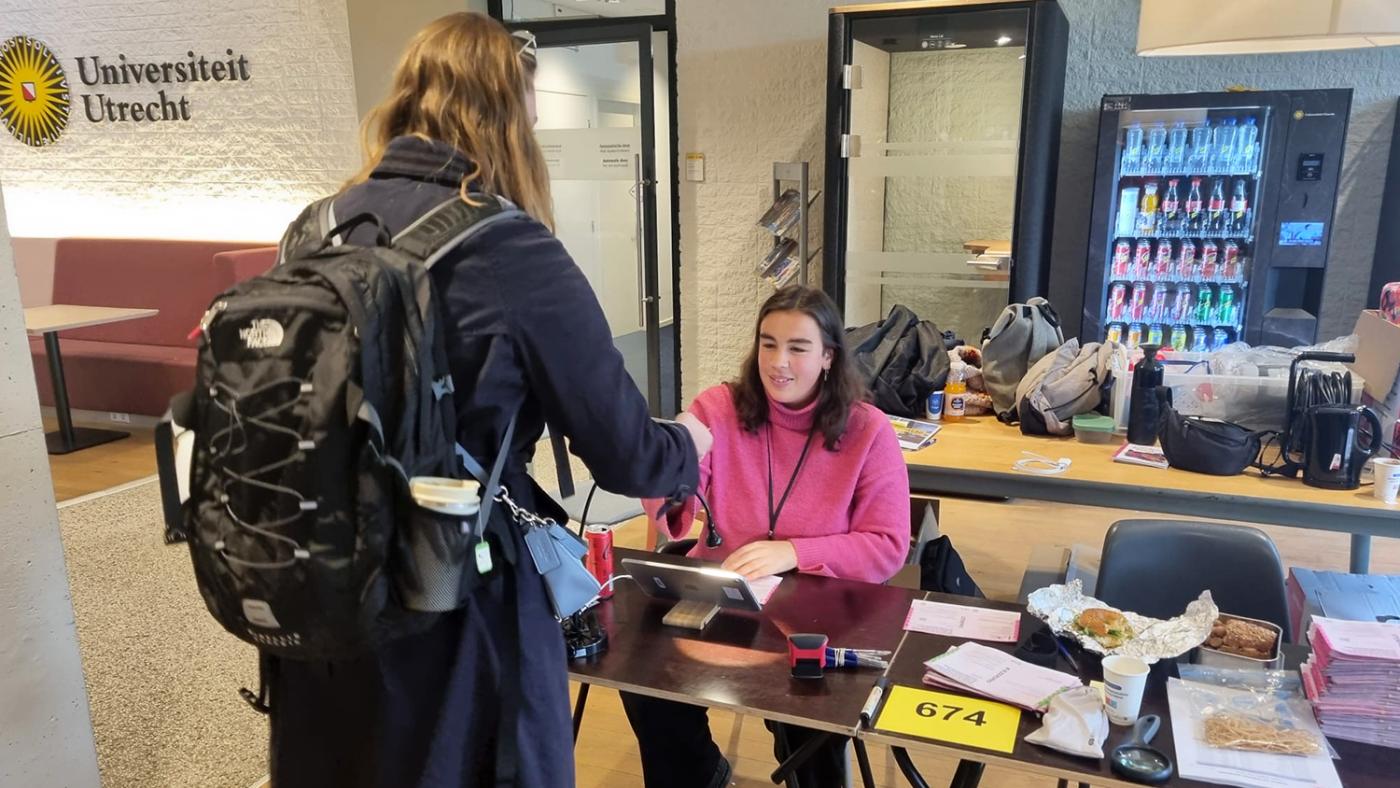
The Dutch Members of Parliament submit motions for almost every debate, forcing other political parties to take a stand on the topic at hand. If a motion is passed, the government must act on it.
Dutch voters are heading to the polls today, October 29, to choose the new members of parliament. How have the different political parties voted on motions related to higher education and research? Which motions were passed and which were rejected?
No “balloon terror”
Sometimes, parties submit nonsensical motions with the primary intention of casting other parties in a bad light and sharing screenshots of their vote online. This practice is known as “balloon terror”, as explained by TV show host Arjen Lubach. We have strived to skip such motions in the analysis below.
We have also left out all the motions on budget cuts. After all, the governing parties entered into a coalition agreement that they could not deviate from. Besides, they made compromises with opposition parties to ensure the education budget passed in the Senate. As a result, the votes on motions regarding the austerity measures say little about what individual parties actually believe.
International students
A few years ago, a large political majority wanted to reduce the number of foreign students coming to the Netherlands. The easiest way to do this would be to make Dutch the language of instruction at the bachelor's level, making those programmes less attractive to international students.
The idea was that all English-taught bachelor's programmes would undergo a language test to determine whether English was the best language of instruction. As a result, the higher education sector wasn't so sure that this would be a good idea. The business community, which often depends on an international workforce, sounded the alarm as well.
Slowly but surely, some nuance crept in. Even the governing parties realised that the Netherlands could use some talent from abroad in certain fields and regions. Universities then decided to take the bull by the horns and say: "Let us decide for ourselves which programmes will become bilingual or switch to Dutch altogether." Their initiative was well-received in the political arena.
As a result, two motions were passed this spring. One of them proposes to scrap the language test altogether. Another suggests making agreements with universities and universities of applied sciences about how to reduce English-taught education.
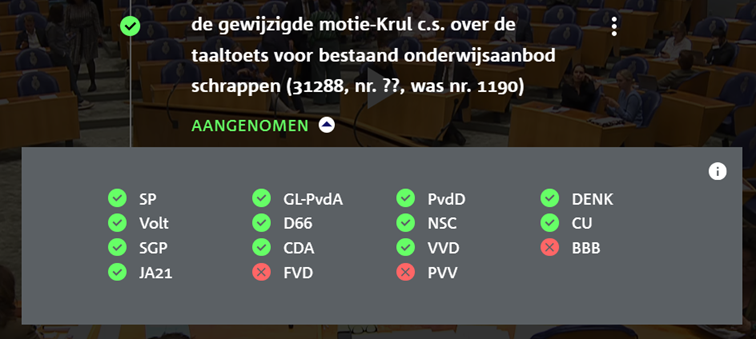
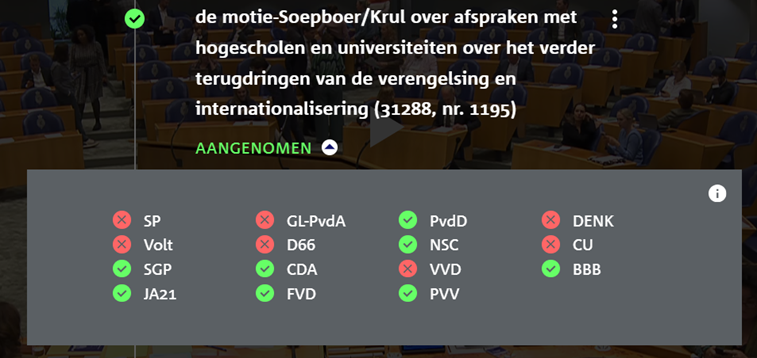
The first image shows which parties voted to scrap the language test for existing bachelor's programmes. The second concerns the parties who agreed with the motion calling on the government to enter into agreements with universities in this regard.
Discrimination: Do we want to know more about this?
The student financing organisation, DUO, conducted an investigation into fraud that almost exclusively targeted students with a migration background. The previous government apologised, and the current government decided to cancel all fines and recoveries. However, the repayments will take some time.
The political party Denk inquired about the current situation. After all, the psychological and financial damage to the students and graduates affected is considerable. The party also wanted to know how many students have already been compensated, whether any bottlenecks exist, and whether the amount made available to compensate them is sufficient. The then minister of education (an NSC member) was fine with this, but some parties preferred not to receive this information.
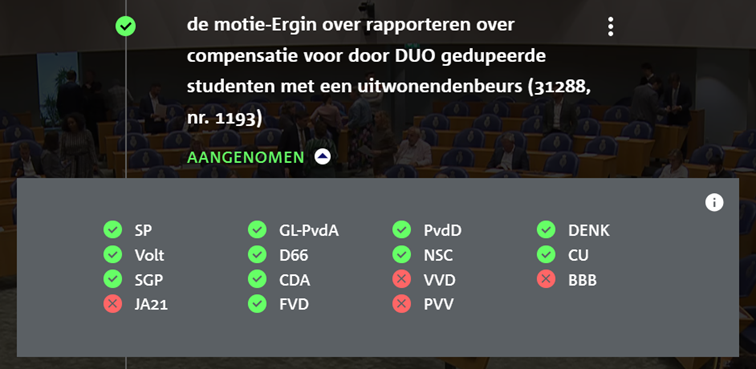
This is how the different parties voted on the motion calling for more information about the students and graduates affected by DUO's fraud case.
Student finance
What does students' financial situation look like? Should the basic grant (a benefit given to all Dutch students, which European students can get as well, as long as they meet certain criteria. Ed.) be increased? A motion was proposed to investigate that. Once again, some parties wanted nothing to do with this, while others saw no harm in it.
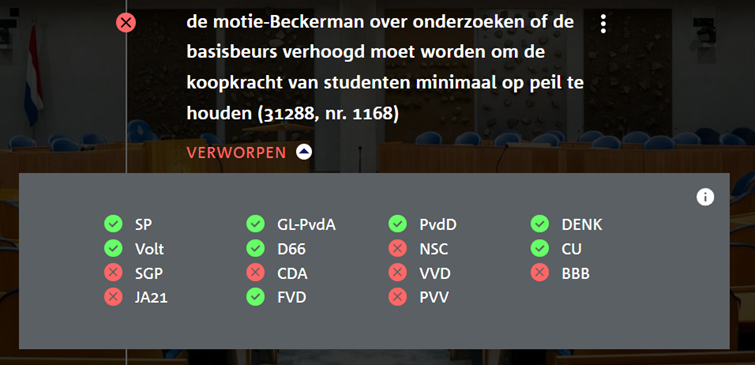
This is how each party voted on that motion.
Internship discrimination
Jochem and Julia find internships easily, but Achmed and Fatima do not. Sometimes, teachers and staff do not know what to do when their students face internship discrimination. A motion calls on universities to take responsibility in the fight against this type of discrimination and implement an “active policy”.
The then Minister of Education considered the subject important, but called the motion superfluous. According to him, universities are already doing everything they can in this regard. The latter may explain why CDA voted against it, as the party dislikes superfluous motions.
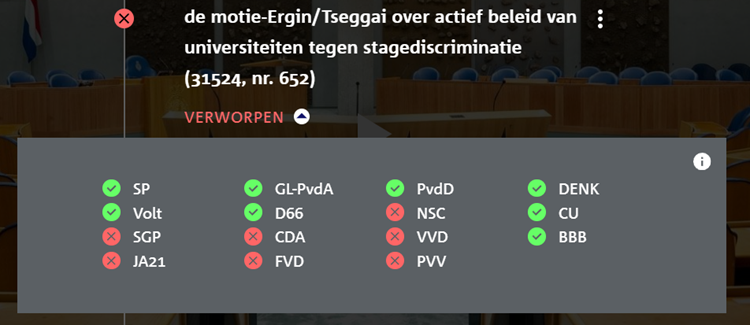
This is how each party voted on that motion.
Internship allowances
In the Netherlands, it is not mandatory for companies to compensate interns for their work. Sometimes internships are paid, sometimes they are not. Only 42 per cent of vocational students receive an internship allowance. The figure rises to 75 per cent among students from universities of applied sciences. At the research university level, only 65 percent of compulsory internships are paid. Voluntary internships have a better chance of being compensated: 91 per cent of students on voluntary internships receive an allowance.
Some parties believe that interns should not be allowed to work without payment. The Minister of Education is keeping the threat of an obligation in reserve. Other parties, however, do not see the point. They argue that small businesses will stop offering internships altogether if they cannot bear the costs of hiring interns, so interns would be worse off if compensation became mandatory.
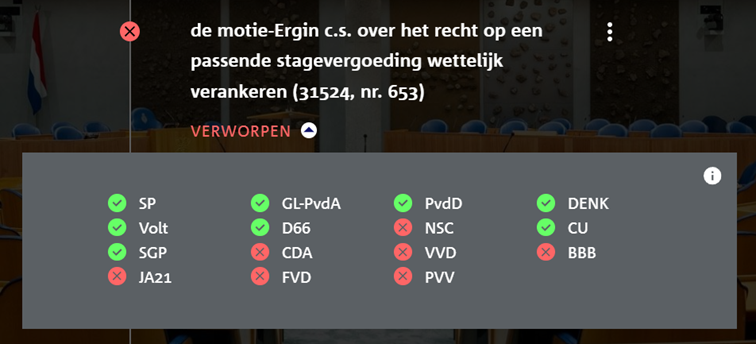
This is how the parties voted on a motion to make remuneration mandatory for interns.
Perhaps one could come up with a solution for small businesses? A motion submitted to the Dutch Lower House proposed establishing a public-private internship fund so that interns working for small companies could also receive remuneration. In the image below, you can see that most parties were in favour of this idea. The minister called it a sympathetic plan and said he was willing to explore that possibility, even though three parties disagreed.
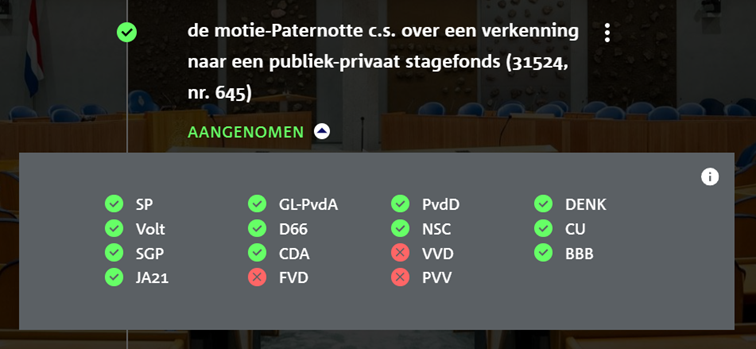
Protests
University administrators must sometimes deal with protests at their institutions. Occasionally, there are a few troublemakers among well-intentioned demonstrators. What should they do about that? Ban demonstrations, call the riot police to clear occupied buildings or insist on establishing a dialogue after all?
The parties that are most aligned with protesters' concerns (such as universities' ties with Israel or the fossil fuel industry) believe that such considerations should be left to university administrators, not the government.
However, other parties argue that politicians expect something from administrators. They argue that vandalism, intimidation and the threat of violence are unacceptable because they jeopardise academic freedom. In their view, the minister of education should make this clear to executive boards that they must intervene when their rules of conduct are seriously violated.
You can see how each party voted on that motion below.
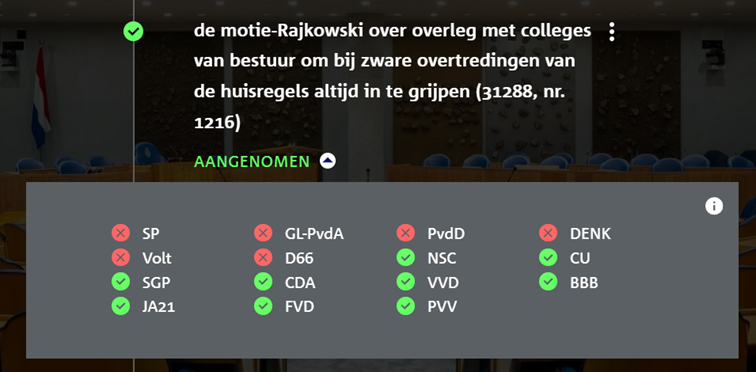
Business
Companies sometimes pay for a chair (i.e., the salary of a professor who specialises in a specific subject). They also occasionally commission universities to carry out research. This “third stream of funding” accounts for around 18 per cent of all income.
Some parties view this with suspicion. Though they acknowledge that collaborating with the business community can be interesting, they believe that academia must remain independent. Others see no problem with it.
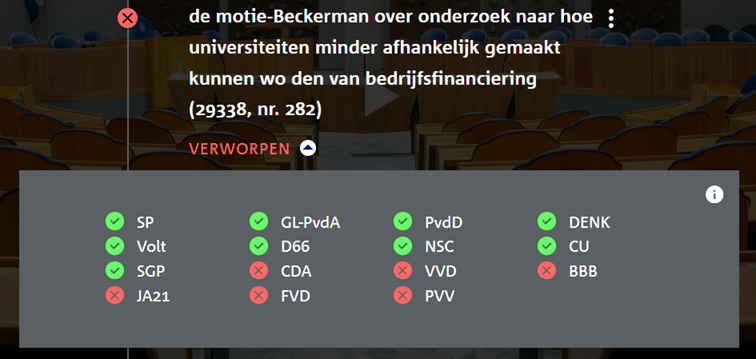
This is how each party feels about the "third stream of funding."
United States
The fact that Donald Trump is attacking higher education and research in his own country may offer Dutch universities an opportunity to attract researchers and students from the United States.
The question was not whether the Netherlands should establish a fund to attract these scholars, as 40 million euros were later allocated for this purpose. The point of discussion was whether this fund should focus specifically on the United States. After all, this could rub an ally up the wrong way.
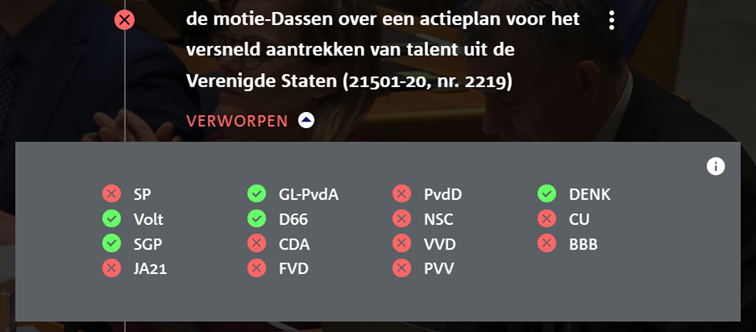
This is how the parties voted on the motion regarding the fund to attract students and scientists from the United States.
Housing shortage
Young people are among the most affected by the housing crisis in the Netherlands, but they were not represented at an important meeting between the government, housing associations and private investors. A majority of MPs believe that this must change. However, some parties see little point in giving young people a seat at the table. Please find how the parties voted on this matter below:
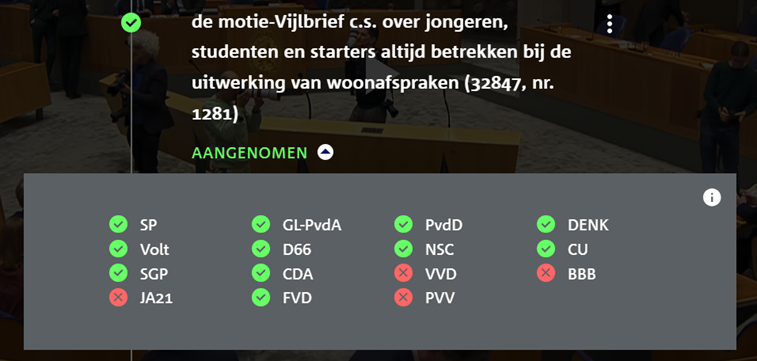
Comments
We appreciate relevant and respectful responses. Responding to DUB can be done by logging into the site. You can do so by creating a DUB account or by using your Solis ID. Comments that do not comply with our game rules will be deleted. Please read our response policy before responding.